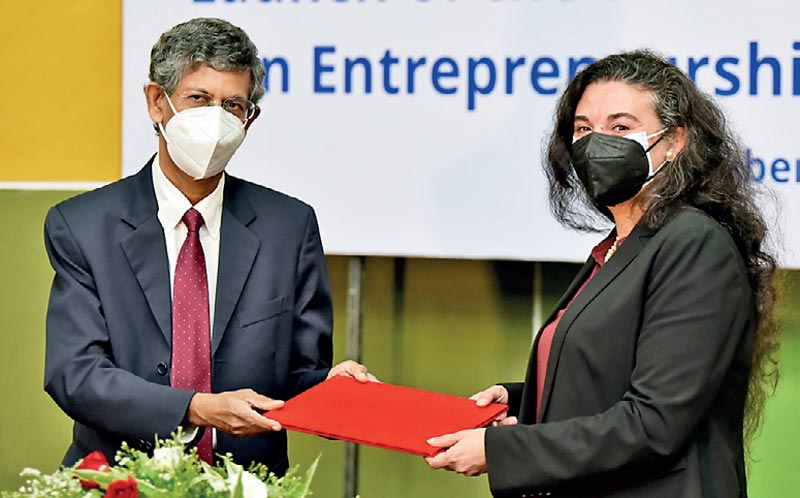Saturday Feb 21, 2026
Saturday Feb 21, 2026
Wednesday, 10 November 2021 02:55 - - {{hitsCtrl.values.hits}}

Less than 30% of Sri Lankan youth consider self-employment as an ideal career, according to a 2018 study. In Sri Lanka, being an entrepreneur is still viewed as a high-risk, unstable career option, with preferences leaning towards employment in the public sector, the results of which is an entrepreneurial culture characterised by ‘push’ factors, with individuals forced to turn towards entrepreneurship out of necessity, rather than the motivation to take advantage of an opportunity.
In response, the ILO’s South Asia Leadership in Entrepreneurship Programme (SALE) will aim to boost young people’s transition into the entrepreneurial world and create a shift in the entrepreneurial ecosystem through several strategic interventions. One of these is a key two-year partnership between the Ceylon Chamber of Commerce and the ILO in Sri Lanka, which begins today to promote entrepreneurship amongst the country’s youth and create a more enabling environment for aspiring entrepreneurs. A highlight of the SALE program is the introduction of a new national competition for young entrepreneurs to pitch their business ideas, receive necessary support, and stand a chance to win the ‘Youth Entrepreneur Spark’ (YES) Award.
“Sri Lanka is yet to capitalise on the full potential of entrepreneurship. This situation is not due to a dearth of innovative ideas, or lack of passion among youth, but rather a result of a less than ideal entrepreneurship eco-system,” says Country Director for ILO Sri Lanka and the Maldives Simrin Singh. “COVID-19 has highlighted the need for innovative thinking and an accelerated need for new business solutions and services, especially opportunities in the digital economy. To drive entrepreneurship, we need to ramp-up efforts across the board in providing young people with the necessary access, resources, and skills, alongside shifting mindsets and creating support systems.”
Speaking about the partnership with ILO, the Ceylon Chamber of Commerce Secretary General and CEO Manjula de Silva said: “We see entrepreneurship as the most important catalyst of economic development as it is the entrepreneur who will mobilise other resources to create value. Promoting entrepreneurship among the youth and their key influencers such as parents and teachers will go a long way to establish a pipeline of startups. The Ceylon Chamber of Commerce is very pleased to collaborate in a project of this nature which can bring lasting benefits to the youth of this country.”
Taking a holistic approach to bolstering youth entrepreneurship, the SALE programme will also introduce entrepreneurship curricula in upper-secondary schools, universities and tertiary academic institutions, offer select participants the opportunity to benefit from ILO’s flagship ‘Start and Improve Your Business’ (SYIB) training, mentorship from the private sector, spearhead policy dialogues and forums on the impacts of entrepreneurship promotion in the national economy, and implement advocacy and awareness campaigns to improve wider public image and support to young entrepreneurs, amongst others.
“President Biden has said, ‘Getting our economy back means bringing our small businesses back.’ And so, the US Government is focusing on small business growth as the key to our own recovery. The US Embassy is pleased to partner with the Ceylon Chamber of Commerce and the ILO to promote entrepreneurship in Sri Lanka to make the economy stronger and more inclusive, especially for women and historically disadvantaged groups,” said US Embassy Colombo Economy Chief Phillip Loosli.
Extending beyond job creation and potential for decent work opportunities, entrepreneurship disrupts the status-quo, injecting new thinking, pre-empting solutions, and paving the way for constant change. When combined with the creativity, drive, and skills of young people, it creates a formidable force that can pave the way for reaching the ambitions of the 2030 Sustainable Development Agenda.